21 Members of the Media in Turkish Prisons, Many More Journalists and Social Media Users Facing Trial

VIENNA – OSCE Representative on Freedom of the Media Dunja Mijatović today urged Turkish authorities to reform laws that endanger free expression and media freedom, following the release of an updated study on imprisoned journalists.
“There are 21 members of the media in prison in Turkey today and many more journalists and social media users face trials that could result in prison sentences,” Mijatović wrote in a letter to Foreign Minister Mevlüt Cavusoğlu, sharing the study. “The specter of prison cannot be overstated, as it can increase self-censorship among journalists and social media users.”
The Representative welcomed the fact that significantly fewer journalists were in prison since the first study was released in 2011. But she noted that laws allowing for imprisonment for journalistic work are still used to punish critical and dissenting voices.
“The study highlights the need to reform the laws criminalizing freedom of expression, as well as their implementation by the courts,” Mijatović said. “Previous legal reforms have not been exhaustive enough to ensure pluralistic dialogues in the society. The majority of recent changes in several laws have further limited the right to express critical ideas.”
The study, carried out by prominent media expert and journalist Erol Önderoğlu, updates information on journalists in prison and identifies the laws most often used for convictions. The Representative welcomed the constructive exchange of information with the Ministry of Justice about the status of journalists in prison, noting that the Ministry’s remarks were incorporated into the table.
The Representative said that media outlets reporting about sensitive issues are often regarded by the authorities and courts as potentially supportive of terrorism. She said, the legitimate right of governments to fight terrorism can only be strengthened by guaranteeing citizens the right to report or comment on all issues of public interest.
The Representative also noted that intimidation of journalists and social media users by high public officials has become a widespread practice and urged Turkey to align with international standards calling for a higher threshold for criticism by public officials.
“Criminal charges against journalists and social media users for insulting public officials can threaten the freedom and safety of these journalists and Internet users,” she said. They can also further weaken freedom of expression and media freedom in Turkey.”
Mijatović urged Turkey to embark upon a comprehensive reform of the related laws, including the Criminal Code, the Anti-Terror Law and the Internet Law. She offered her Office’s full support in assisting with the legal reforms.
The study can be accessed here: http://www.osce.org/fom/173036.
The Office of the Representative has been calling for legal reforms in Turkey since it was established in 1997. Earlier versions of the study on imprisoned journalists are available here: April 2011, http://www.osce.org/fom/76374 and http://www.osce.org/fom/76373; April 2012:http://www.osce.org/fom/89371; March 2014:http://www.osce.org/fom/116291?download=true; and June 2014: http://www.osce.org/fom/119921?download=true.
The OSCE Representative on Freedom of the Media observes media developments in all 57 OSCE participating States. She provides early warning on violations of freedom of expression and media freedom and promotes full compliance with OSCE media freedom commitments. Learn more atwww.osce.org/fom, Twitter: @OSCE_RFoM and on www.facebook.com/osce.rfom.

